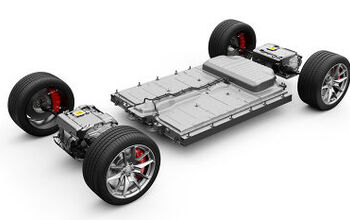Toyota Is Circling The Wagons To Fend Off The Yen

“Producing in Japan will remain extremely difficult as long as the conditions don’t change,” said Akio Toyoda today, and appealed to the Japanese government to “level the playing field.” Toyota did some leveling of its own. In a big board meeting, Toyota leveled swaths of corporate structures.
There are people who know that the Toyota Group, Toyota Motor Corporation, and Toyota the car brand are different animals. Some may be aware that Toyota, Daihatsu and Hino belong to Toyota Motor Corporation. Drawing an org chart of the subsidiaries and factories surrounding and connecting the various Toyotas however would be akin to mapping an anthill. That task will get a little bit easier in the future.
In a hastily arranged press conference (as in “drop everything and be there by 4, we are so sorry”) that took place in Nagoya, Tokyo and Tohoku at the same time via videoconference, it was announced:
“Toyota Motor Corporation (“Toyota” (President: Akio Toyoda)) and subsidiaries Toyota Auto Body Co., Ltd. (“Toyota Auto Body” (President: Takuji Amioka)) and Kanto Auto Works, Ltd. (“Kanto Auto Works” (President: Tetsuo Hattori)) have reached an agreement with respect to the conversion of Toyota Auto Body and Kanto Auto Works to wholly-owned subsidiaries of Toyota through share exchanges (expected January 2012). In addition, Kanto Auto Works, Central Motor Co., Ltd. (“Central Motor” (President: Toru Kuzuhara)) and Toyota Motor Tohoku Corporation (“Toyota Tohoku” (President: Masami Sugiyama)) have reached an agreement to begin discussions for the proposed merger and integration of the three companies (targeted July 2012).”
You got that? Now, close your eyes and repeat.
What is happening is that TMC is streamlining its operations at home. Toyota Auto Body and Kanto Auto Works, currently separate companies that are traded separately at the Tokyo stock exchange, will come under the TMC fold. Central Motor and Toyota Motor Tohoku will most likely follow.
The re-org will allow the business units to be involved in the development of the cars they produce. Toyota expects higher efficiencies and lower costs from that measure. Asked whether jobs will suffer, Toyota’s photogenic executive vice president Atsushi Niimi said that Toyota plans to protect full-time jobs. Meaning: Temporary workers, your time may be up. How about the 3 million cars Toyota wants to produce at home, asked a reporter. “We will try to maintain the 3 million unit level,” answered Niimi.
“Three million units would be the minimum that would allow us to maintain employment,” added Toyoda. “We will try to maintain that.”
In other words: Less than 3 million cars produced at home, and permanent workers will also stay at home.
There is only so much that can be achieved through cost cuttings. To keep producing 3 million Toyotas in Japan, more than half of that needs to be exported. The yen gets stronger by the day, and it turns into a fight against the windmills of the foreign exchange.
“What level of exchange rate can you withstand? I think you had mentioned 82 to 83 yen to the dollar a while ago,” said a reporter from The Nikkei and suggested: “Will you be able to make a profit at 75 yen to the dollar?”
Niimi did not take the bait: “At the current exchange rate, frankly speaking, it is very tough. You mentioned 82 to 83 yen to the dollar. We would rather have 85 yen to the dollar.” The 75 yen suggestion remained uncommented.
The re-org has nothing to do with the earthquake and tsunami, said Toyoda, and he reminded everybody that the discussions had started in May of last year. If there was a tsunami involved, then it was a wave of yen buying. Last May, a dollar bought around 93 yen, and that was considered dangerous at the time. Today, a dollar fetches around 79 yen.

Bertel Schmitt comes back to journalism after taking a 35 year break in advertising and marketing. He ran and owned advertising agencies in Duesseldorf, Germany, and New York City. Volkswagen A.G. was Bertel's most important corporate account. Schmitt's advertising and marketing career touched many corners of the industry with a special focus on automotive products and services. Since 2004, he lives in Japan and China with his wife <a href="http://www.tomokoandbertel.com"> Tomoko </a>. Bertel Schmitt is a founding board member of the <a href="http://www.offshoresuperseries.com"> Offshore Super Series </a>, an American offshore powerboat racing organization. He is co-owner of the racing team Typhoon.
More by Bertel Schmitt
Latest Car Reviews
Read moreLatest Product Reviews
Read moreRecent Comments
- ToolGuy TG likes price reductions.
- ToolGuy I could go for a Mustang with a Subaru powertrain. (Maybe some additional ground clearance.)
- ToolGuy Does Tim Healey care about TTAC? 😉
- ToolGuy I am slashing my food budget by 1%.
- ToolGuy TG grows skeptical about his government protecting him from bad decisions.

































Comments
Join the conversation
Maybe it's that the dollar is falliing?
While I don't understand the why's of Yen/$ value, I do understand the issues of running a business that involves planning around exchange rates. Plan: 95% utilisation $.82/Euro Actual: 80% utilisation $1.20/Euro* Company being German owned. Apply the same to (let's say toyota's tundra plant). They are being squeezed from both sides and other than Yen intervention it's jobs at home**, I don't know if Japanese have ability to control the Yen anymore, especially while it seems that the US will continue to QE (Japan has been doing it for decades now, only so much of the juice). *being the simple (US) controller I requested to hedge operating leases that were in Euro, was told no (apparently the CFO had tried hedging once in the 70's and it backfired), difference in exchange (which happened in months) meant $130k/month became $240k/month. **or making products faster/cheaper, Toyota already did that one and it GMed on them.